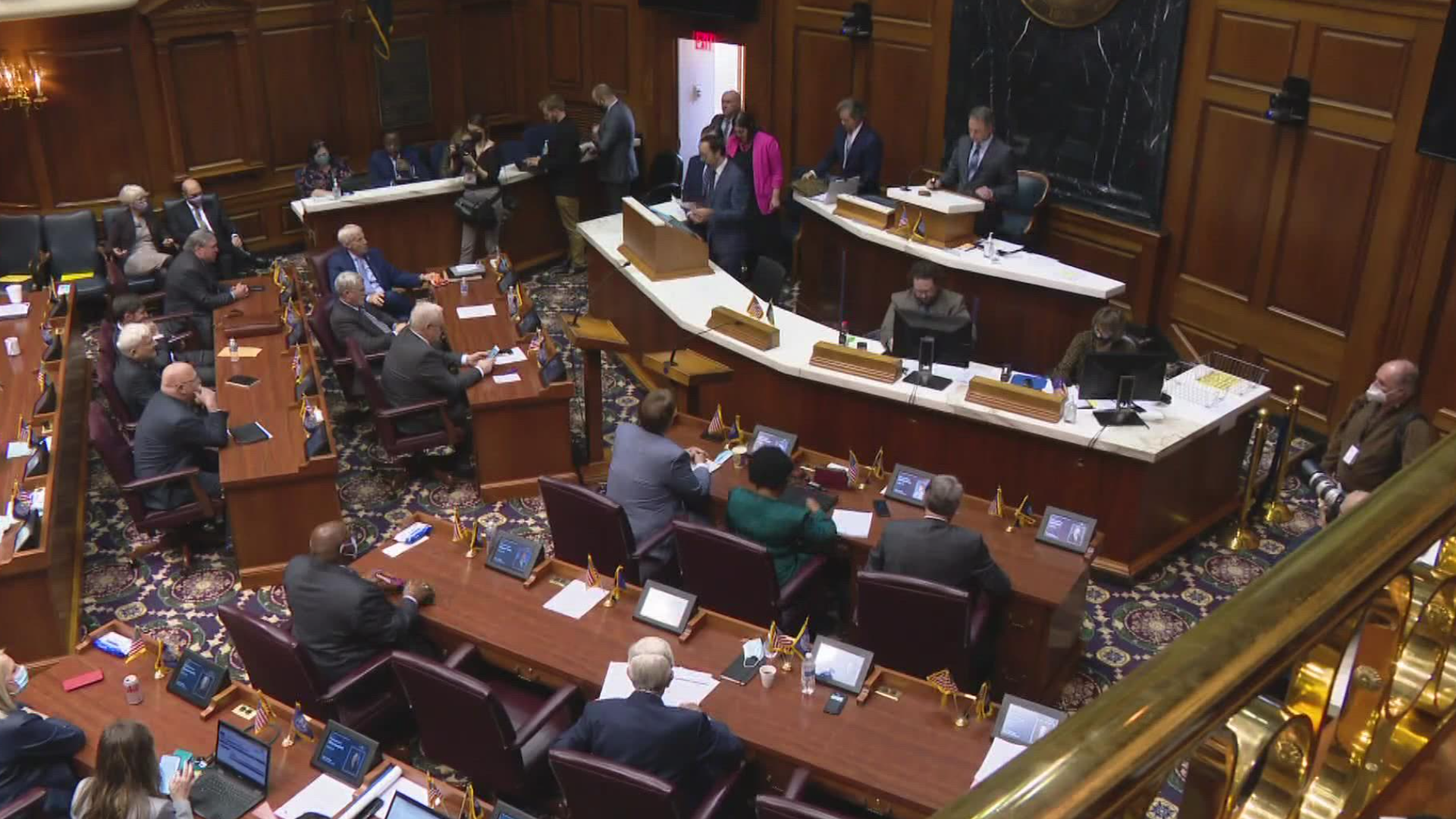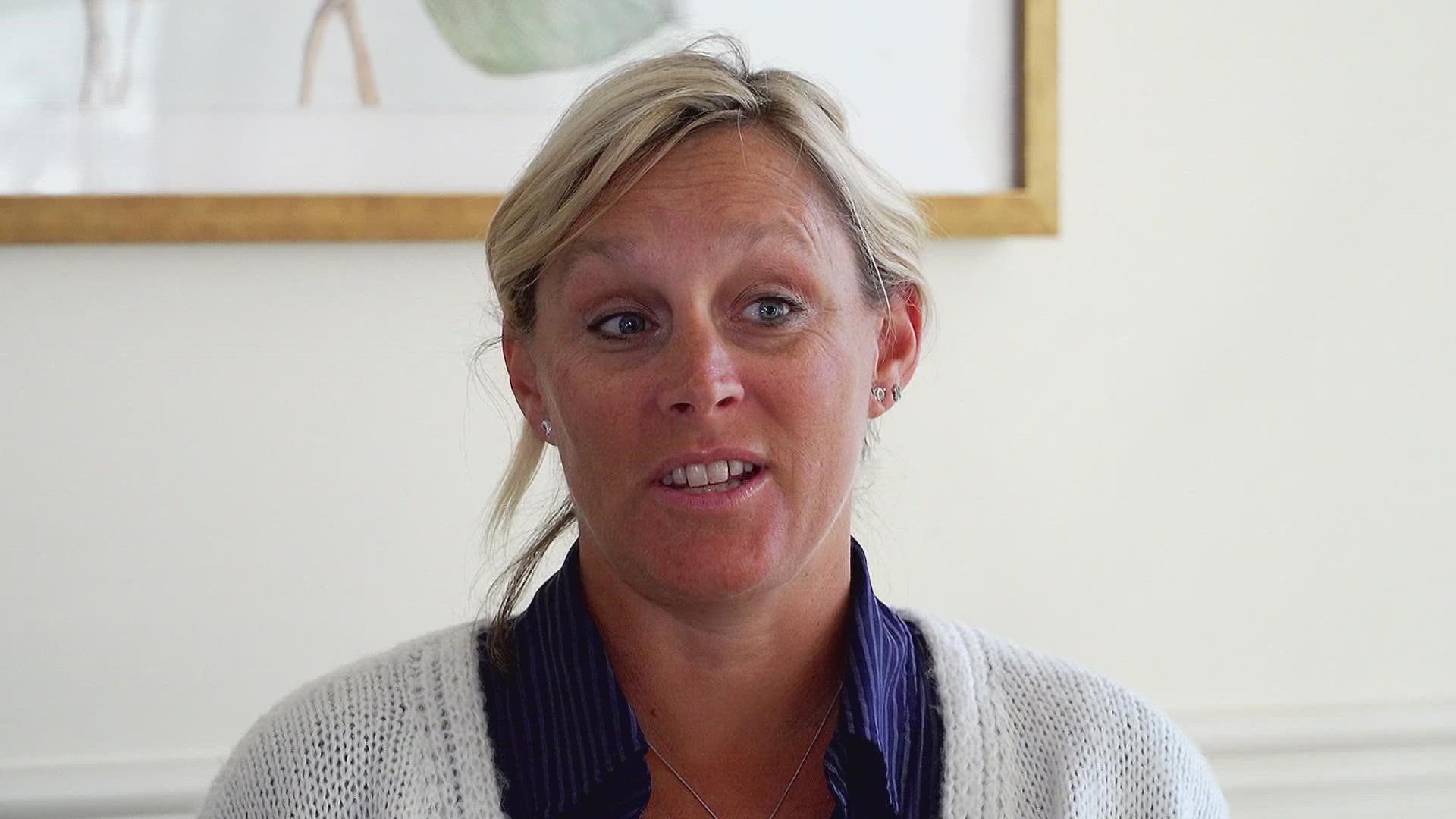Indiana balance of power on the ballot
In Indiana, a supermajority means Republicans currently hold more than two-thirds of the seats in both chambers.

Outside of a home in Zionsville, Republican Liz Childers straightened one of her political signs. To the surprise of many, one of the candidates was not a Republican, instead a Democrat hoping to become her state representative.
"I know it's a shock to a lot of people,” Childers said. “When I put that sign in my yard. I got three text messages that same day, like, ‘What is happening?'”
Childers is a vocal member of the GOP with hopes of running for office one day as a Republican candidate. For the first time in years, her party isn’t guaranteed her vote. Instead, she tells 13News, she plans to vote split ticket – in large part because her party passed a near-total abortion ban this summer.
“It really woke me up to say, 'I’m a Republican because I believe in less government,'” she said. “I believe in getting them out of my lives. There couldn’t be any more overreach of government than telling me what I can do for myself and what decisions I make for my body.”
Her twin sister, Norma Unser, who is also a Republican, agrees. She said the abortion law is going to make her look more closely at candidates instead of just going with the candidate with an "R" by their name.
“At the federal level, yes, I’ll still be voting strictly Republican,” Unser said. “It’s at the local level that I’m going to be looking a little closer than I have before and that’s mainly because I’d like to see both sides be more moderate.”
Childers thinks there’s a lot of Republican women like her. Women who aren’t just upset with the party, but also willing to vote for a change at the Statehouse. She loves to see Republicans win, but thinks at this point the GOP’s supermajority pushes the party further to the right than she likes.
“I believe that it would be beneficial for our state to have that broken up a little bit,” Childres said. “I mean, I hate to say that, because I want to win and I want to be with the Republican Party, and I want to hold all the seats, but I also think it’s time for us in a state to be leaders about bringing us together in the middle.”
Can the super majority be broken?
13News spoke to three political scientists to find out if the supermajority can be broken during this general election. All three told 13News there’s a chance but say they would be surprised if it happens.
“I would say it's possible not probable,” said Chad Kinsella, an associate professor of political science and manager of the Bowen Center at Ball State University.
The three political science professors at Indiana universities say the best path to break the supermajority is in the state House of Representatives, where there are more competitive races.
"It's certainly going to be an uphill battle,” said Elizabeth Bennion, Chancellor's Professor of Political Science at Indiana University South Bend.
“I do know that other analysts have projected a potential break for the supermajority of Republicans in the general assembly and, while it is possible, I am not as convinced it is likely,” said Laura Merrifield Wilson, an associate professor of political science at the University of Indianapolis.
In order to break the supermajority, Democrats would have to keep all 29 of their current seats and pick up five or six more. Even if the party is successful, the GOP will still hold the majority and have control of both chambers and the governor's office.
What is a supermajority?
In Indiana, a supermajority means Republicans currently hold more than two-thirds of the seats in both chambers. There are 50 Senate seats and 100 representatives in the House. Currently, there are 39 Republican senators to 11 Democrats and 71 GOP representatives to 29 Democrats.
With those margins, Republicans can conduct business without a single Democrat present.
“It gives them (Republican caucus) a lot of power to push things through even without the governor,” Kinsella said.
If the Democrats can pick up enough seats, they wouldn’t have the votes to push their agenda, but the caucus could impact legislative procedures.
"At least give them some power, whereas now there is none at all,” Kinsella said.
The Indiana Republican Party says it’s not worried about losing the supermajority.
“No, we believe Hoosiers will continue to place their trust in us to deliver results for them,” said Luke Thomas, press secretary for the Indiana Republican Party.
Contract with women
However, Indiana Democrats are fighting for the possibility of upsetting the current balance of power. Three weeks before Election Day the party rolled out a contract with women hoping to reignite some of the discontent over the abortion law.
The party promises to protect abortion access, contraception, and provide more protections for pregnant workers at the state level. 13News asked how they could make good on those promises without any power at the state level.
“You know what, we've got to start somewhere,” said State Rep. Carey Hamilton, D-District 87, who is running for reelection. “And I think we can make some strides and we'll see what it turns out."
While the Democrats are hopeful the contract appeals to Republican women voters, the Indiana GOP doesn’t think it will work.
“As we’ve said before, we’re seeing intensity and excitement everywhere we go. Hoosiers are ready to get to the polls to hold Washington Democrats accountable for their failed agenda that has made them worse off,” said Thomas.
Up hill battle
Political scientists stress history is not on the Democrats' side. They say history shows there are several factors working against them.
The first is that most people vote a straight ticket, and right now Republicans have an advantage with the U.S. Senate race at the top of the ticket. Normally, the president’s party does not fare well during the midterms.
National polls are also showing many voters are focused on the economy not the abortion issue.
“Some of the advantages (Democrats) saw in August are starting to evaporate already,” Kinsella said.
Another hurdle is Indiana’s new legislative districts are more favorable for Republicans.
“Most Republicans are fairly well protected after the recent redistricting following the 2020 census,” Bennion said. “I know that Democrats are targeting some districts in northern Indianapolis, the suburbs there, as well as the Fort Wayne and South Bend areas where the races are potentially competitive. In those cases, we still do see some advantage for the GOP.”
The GOP got to write those new districts, but Kinsella said it’s not gerrymandering at work, but instead geographic polarization. That’s when people of the same political ideology or belief move and live near each other.
“So, [on] some level, it’s really easy to draw districts,” he said. “You don’t even have to be real creative in drawing them, we’ve done the work for them in some essence.”
Ballotpedia is reporting more than 50 uncontested legislative seats, including the one where Norma lives. She was willing to vote split ticket like her sister for a representative, but she only has one option, a Republican.
"So, I feel like my vote might just be better staying at home and that makes me sad, too,” she said.
She doesn’t want to vote against a Republican, but after this year she’s looking at a way for her voice to be heard.
The twins say they are still Republicans even if they possibly won’t be as in lockstep as before.
If the party doesn’t adjust after this year, one sister worries some voters will become apathetic, while the other is concerned some voters may turn away from the party they love.


